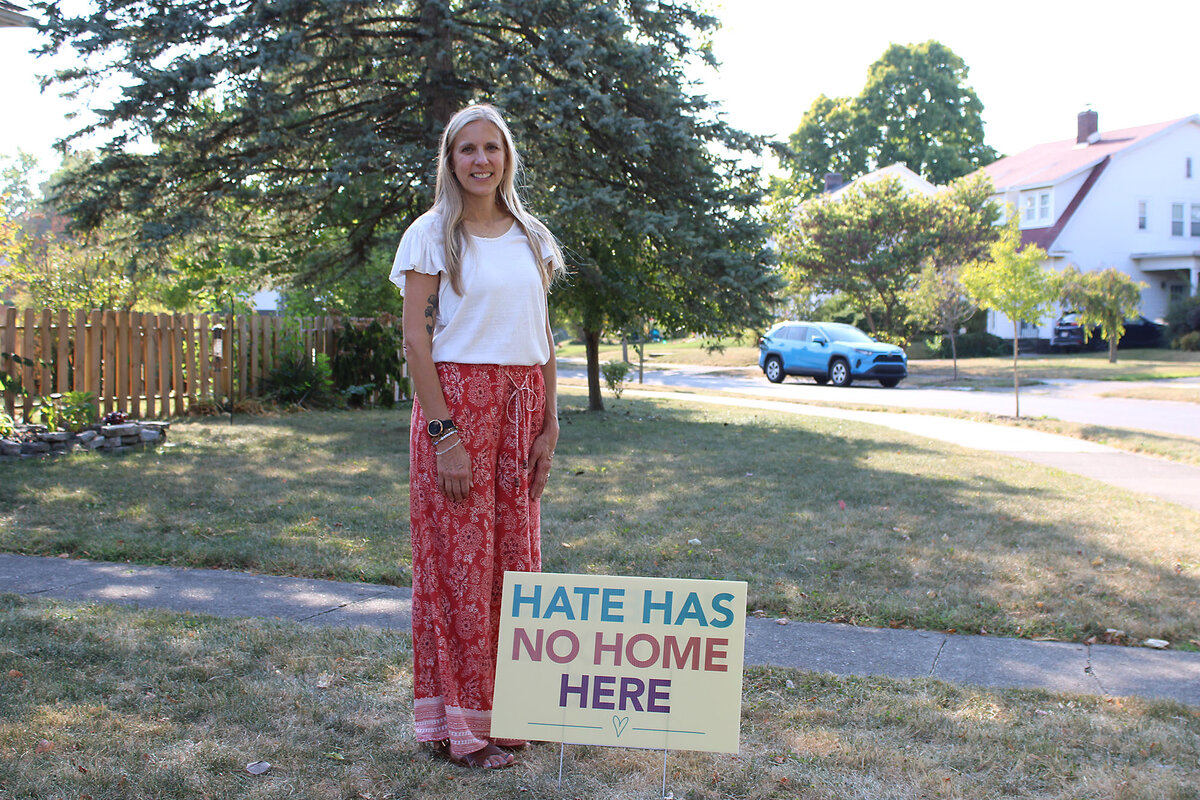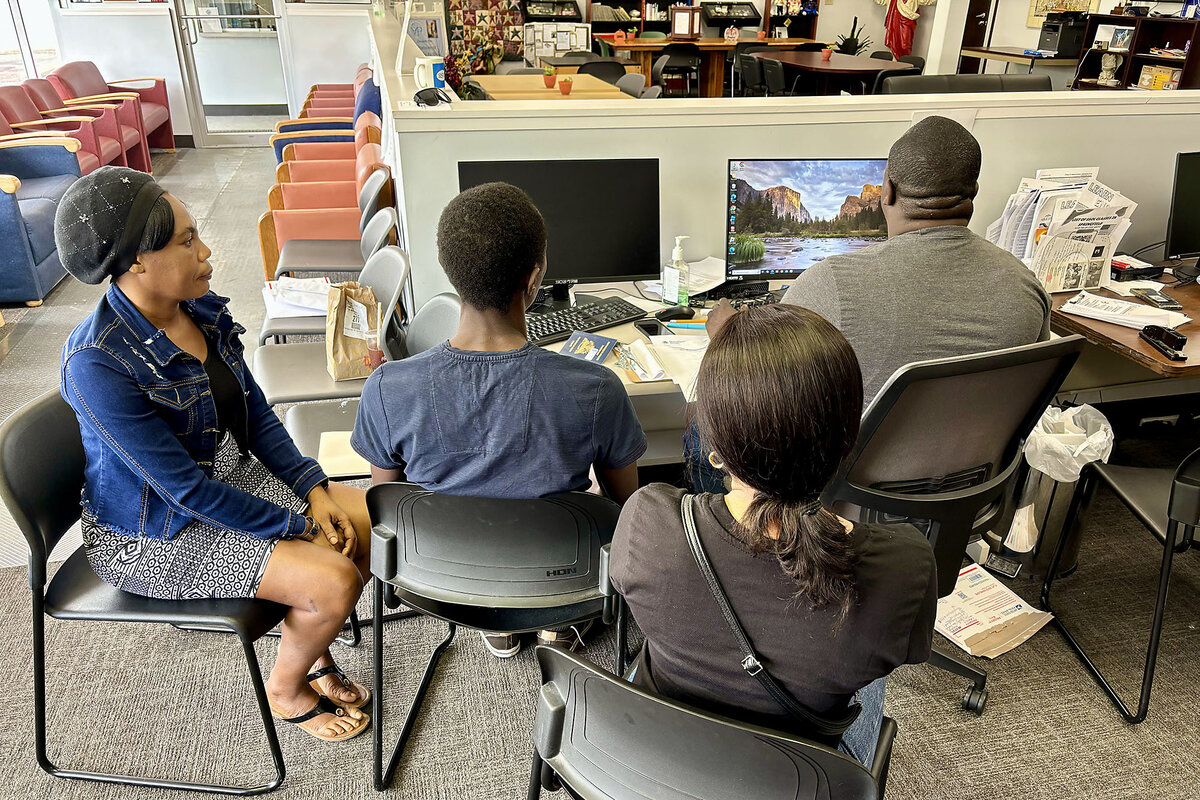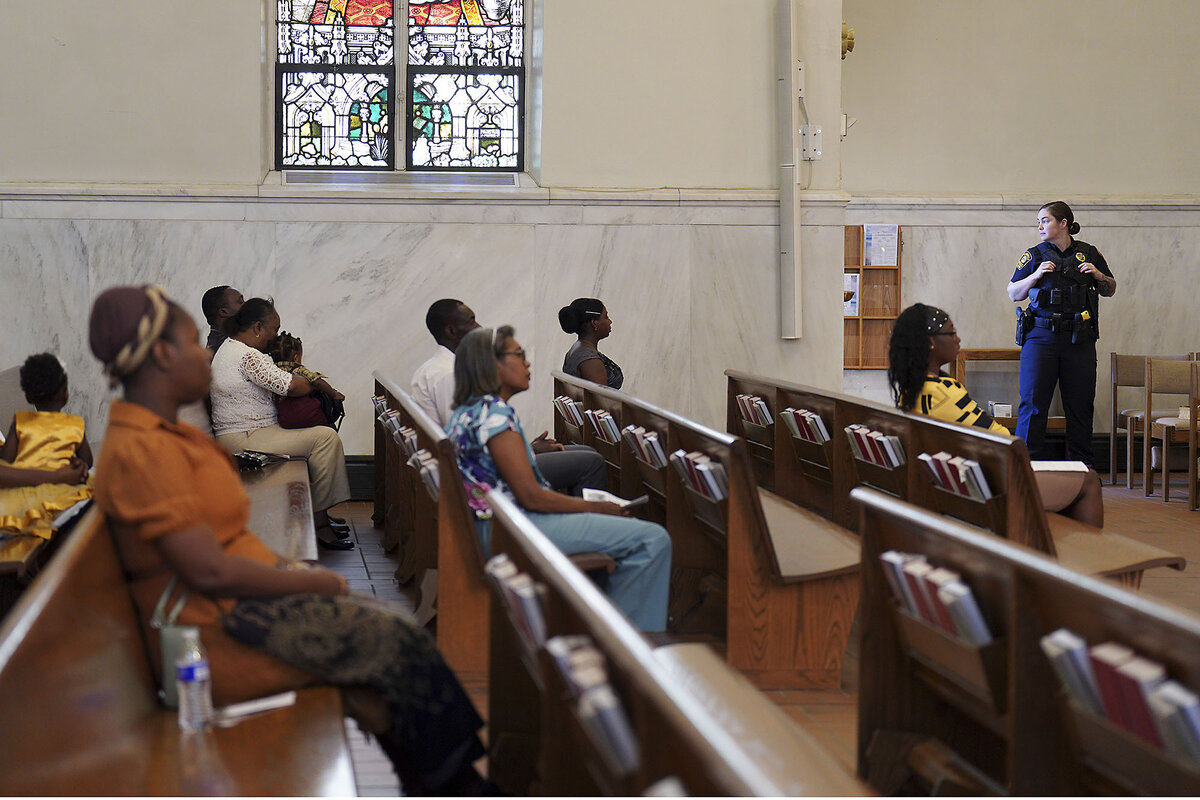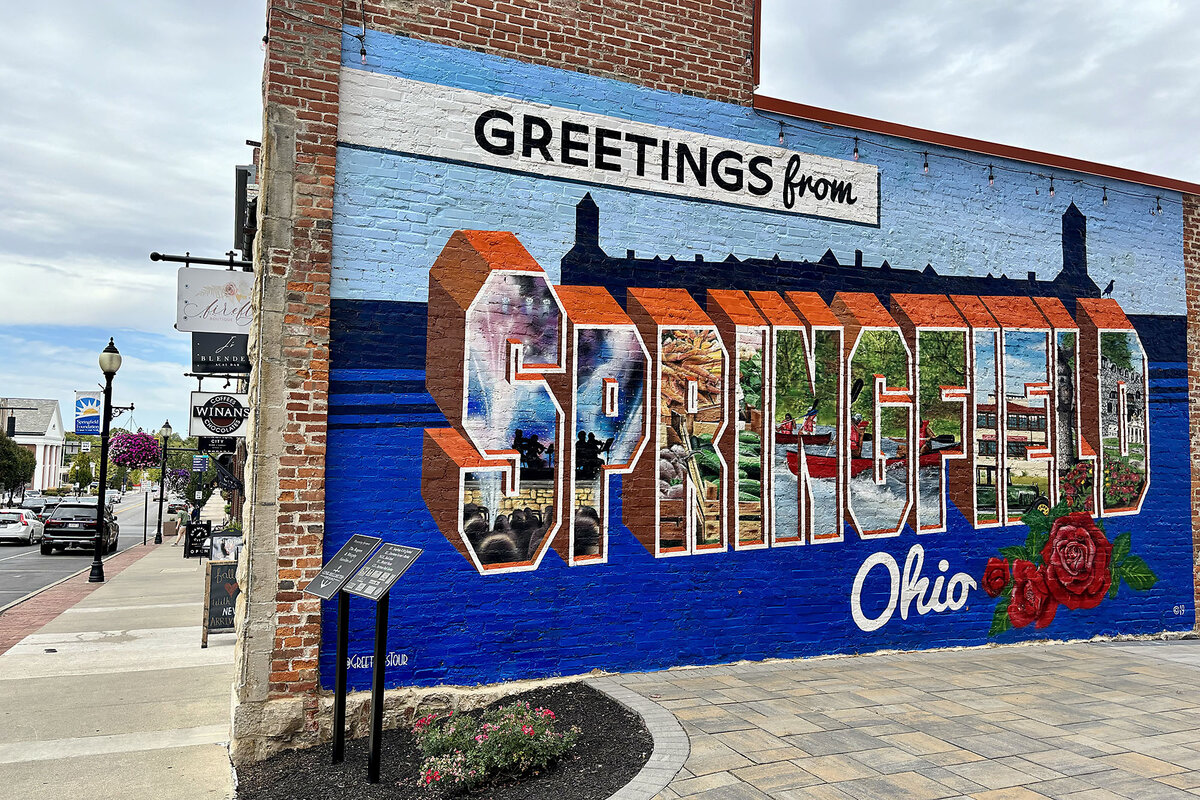The rumors targeted Haitians. All of Springfield is paying the price.
Loading...
| Springfield, Ohio
It was a day of scrapped lesson plans.
On Friday, the second graders in Lisa Pankratz’s class in Springfield, Ohio, were supposed to practice taking measurements, read a story about a chameleon desiring a color of his own, and attend their favorite special – gym class.
Instead, before the school day officially began, teachers at Snowhill Elementary School were rounding up students who had already arrived and turning away others whose parents were dropping them off. A bomb threat tied to a rumor-turned-lie about the city’s growing Haitian immigrant population had forced an evacuation. Ms. Pankratz addressed it delicately.
Why We Wrote This
A story focused onHistorians have long warned that people in the United States need to stop demonizing one another. The costs of acidic rhetoric are on display in Springfield, Ohio, where discredited rumors became a political football.
“What do you notice? ... What do you wonder?” she asked.
Her students offered their observations and questions. So as Ms. Pankratz helped the little ones board a bus bound for the high school, she shared what she could.
“Snowhill is not safe for us to be in right now,” she told them. “We need to go to a place that is safe for you. And remember: My No. 1 job is to keep you safe.”
Dozens of bomb threats have escalated physical safety concerns in this Midwestern city sandwiched between Dayton and Columbus. Multiple schools and city buildings have been evacuated both this week and last, and residents interviewed talk about a simmering sense of unease and daily life disrupted. In a nutshell, Springfield has come under verbal siege.
The city is a parable of the effects that coarsening political discourse has had on U.S. society. Long decried by historians as corrosive, once unleashed, politicized hatred cannot be contained within its banks. And, as Springfield shows, it hurts everyone.
Tensions were brewing here before a discredited rumor about the community’s Haitian immigrants eating neighborhood pets gained traction online. Then it was amplified by the GOP presidential ticket. Former President Donald Trump and his running mate, Ohio Sen. JD Vance, repeated the incendiary claim in interviews, on the debate stage, and on the campaign trail. Gov. Mike DeWine, a fellow Republican, and city officials have said the claim is not true.
Suddenly, Springfield found itself thrust into the national spotlight as the latest backdrop for heated immigration rhetoric less than two months before the election.
Governor DeWine has appeared alongside local leaders in a bid to assuage fears and announce extra security precautions: three dozen state troopers monitoring city schools, “vulnerability assessments” of critical infrastructure, tower cameras strategically placed around town, and bomb-sniffing dogs.
The threats have originated from both foreign and domestic sources, Mr. DeWine says, with many coming from overseas.
Regardless, the swatting attempts have gobbled up time and resources. Residents like Ms. Pankratz feel disheartened. Frustrated, even.
“Why are adults pulling children into this?” she asks. “What do the lives of children have to do with politics?”
The bus full of evacuated children chugged forward Friday, passing her house on a nearby street. Ms. Pankratz looked longingly at her front porch and told her students she wished they could be there, eating pancakes with each other.
The image conjures a joy and unity she hopes to see rise from the aftermath of this turbulent chapter in the city’s history.
How Haitian immigrants power Springfield’s economy
New Diaspora Live, billed as the Midwest’s most diverse studio, occupies a window-framed office inside a popular coworking space in Springfield. But on Tuesday morning, it might as well be located within Grand Central station. Visitors stream in and out of the radio station run by Haitian residents. Others congregate just outside it.
Miguelito Jerome temporarily closed his furniture store. He realized the radio station, where he serves as a radio host and executive manager, plays a pivotal role in changing the narrative.
“We understood that if we don’t address this situation, there is no place safe in America,” he says.
Mr. Jerome came to the United States three years ago. He never intended to stay long-term, but while here, the Caribbean nation’s then-president was assassinated. The violent act threw Haiti into civil upheaval, compounded by an earthquake, and created a humanitarian crisis. The multilingual entrepreneur settled in Springfield, lured by a friend who thought he could help the city’s growing Haitian immigrant population.
It is unclear how many Haitians live in Springfield, although the city website estimates that there are at least 12,000 immigrants overall. The U.S. Census Bureau does not track that data, making it difficult to pinpoint exact numbers. Many Haitians have a legal designation given through a federal program known as Temporary Protected Status. As the name suggests, it temporarily shields certain immigrants from deportation if civil unrest, natural disasters, or other unfavorable conditions would make returning to their home countries dangerous. For his part, Mr. Jerome estimates that about 10,000 Haitians are in the city now.
Temporary Protected Status recipients are eligible for work permits, and when the initial migration surge started, Springfield had what Haitian immigrants needed next – a job. They’re working in warehouses, manufacturing centers, and in the service industry, city officials say. Others are launching their own businesses, such as restaurants and grocery stores.
Governor DeWine has said business leaders told him the Haitian immigrants took positions they were struggling to fill postpandemic. The employment boost, in turn, has been helping power the economy of this once-vibrant manufacturing city.
“Springfield is on the move,” Mr. DeWine said at a press conference Tuesday. “I couldn’t have said that 10 years ago.”
Growing pains and canceled festivals
That’s not to say growing pains don’t exist. Residents say tensions have been bubbling over issues such as unsafe driving habits, language barriers at the grocery store, and long lines at the Bureau of Motor Vehicles. There have been concerns about rent increases and, on the flip side, worries about immigrants’ living conditions and vulnerability to exploitation. Schools, too, have felt the strain of serving hundreds of new-to-country students.
A tipping point came in August 2023 when a school bus crash involving a Haitian driver killed 11-year-old Aiden Clark. Politicians, including Mr. Trump and Mr. Vance, latched onto the tragedy for what Aiden’s father has described as “political gain.” He has pleaded with them to stop using his son’s name for that purpose.
“After the accident, that’s when everything started changing, because it created a situation of fear,” says Mr. Jerome, who ramped up information about safe driving on the radio station.
Still, the city’s Haitian community retreated a bit, he says. It scaled back this year’s plans for a Haitian Flag Day event earlier this year.
The baseless accusations about cats and dogs – since recanted by two local women – stoked those fears within the Haitian community and triggered a ripple effect across Springfield. The bomb threats have caused school attendance to plunge. One school logged 200 students absent out of roughly 500 earlier this week. Wittenberg University moved classes online all week.
The city also canceled its upcoming CultureFest celebration, leaving colorful banners attached to streetlights as signs of what has been lost. City officials called it the “most responsible course of action,” given ongoing safety concerns.
Laura Koveleski, who is Haitian through her mother’s side of the family, strikes a more optimistic tone. She grew up in Springfield before it became a magnet for her fellow Haitians.
“There’s a blessing in disguise in this because now that we have eyes, we definitely have threats, which is a negative, but we have opportunity,” she says.
“We’re just embracing the stranger”
If anyone is keenly aware of this duality enveloping the city, it’s Casey Rollins, executive director of the Society of St. Vincent de Paul in Springfield.
The neighbor-oriented organization has been assisting newly arrived Haitians since 2017. That’s when the first few Haitian immigrants began knocking on the door, seeking help so they could find a job and get settled. Now, a line often forms outside in the morning. Ms. Rollins says the Springfield chapter of the Society of St. Vincent de Paul never intended to jump into immigrant services; it simply evolved to meet the need.
“We’re not bringing anybody here,” she says. “We’re just embracing the stranger once they are here.”
Many are no longer strangers. They have shared meals and holidays together. But the vitriol directed at Springfield and its immigrants has cast a nervousness over the building. Ms. Rollins keeps a watchful eye on the front windows, mentally taking note of who is coming and going. The retired teacher knows that police officers – some her former students – are just a text or call away if danger arises.
This is not what brings her to tears, though.
Over the past week, she has fielded hundreds of supportive calls and emails from people around the world. Lawyers want to provide legal assistance. Doctors and professors want to host education seminars. Others want to donate time, money, or prayers. An anonymous couple, captured by surveillance cameras, even left eight pieces of Haitian artwork at the organization’s back door. Amid the avalanche of messages, Ms. Rollins stayed up until 2 a.m. one day responding to each person.
“I’m like crying through this, thinking, ‘God, this is amazing. This is amazing. It validates what we’re trying to defend,’” she says.
What they’re trying to defend is this: a group of Haitian immigrants huddled around a computer Tuesday afternoon. Their leader, a man who says he immigrated here three years ago and speaks English, was helping them apply for work authorization.
Ms. Rollins says Haitian immigrants typically don’t seek household necessities. More often, they come to the Society of St. Vincent de Paul for interpreters, computer access, and mentors who can guide them through filing paperwork.
In her quest to not let the political noise be a distraction, Ms. Rollins keeps this mantra in mind: “Stop criminalizing, stop demonizing, stop politicizing, and start humanizing.”
“This fight – it’s not just for us”
Back at Snowhill Elementary School, classes resumed Monday. Many students didn’t show up, Ms. Pankratz says, forcing teachers to shuffle lesson plans yet again. The chaos and fear have stymied learning, but one thing has not changed: Ms. Pankratz continues telling her students, including two Haitian children, that she loves them.
It’s a message she wants the city’s youngest members to grow up hearing.
The next generation includes Mr. Jerome’s baby daughter. The radio host says fatherhood has sharpened his resolve to help Springfield move forward.
“This fight – it’s not just for us,” he says. “It’s for the whole community and our kids.”
How is that being done? One human connection at a time.
On Wednesday morning, a laundry list of local officials and community partners convened virtually for a Clark County Haitian Coalition meeting. The chat box lit up with attendees trading contact information and offering help where needed.
Maybe they couldn’t meet in person on this day, but soon they could.













